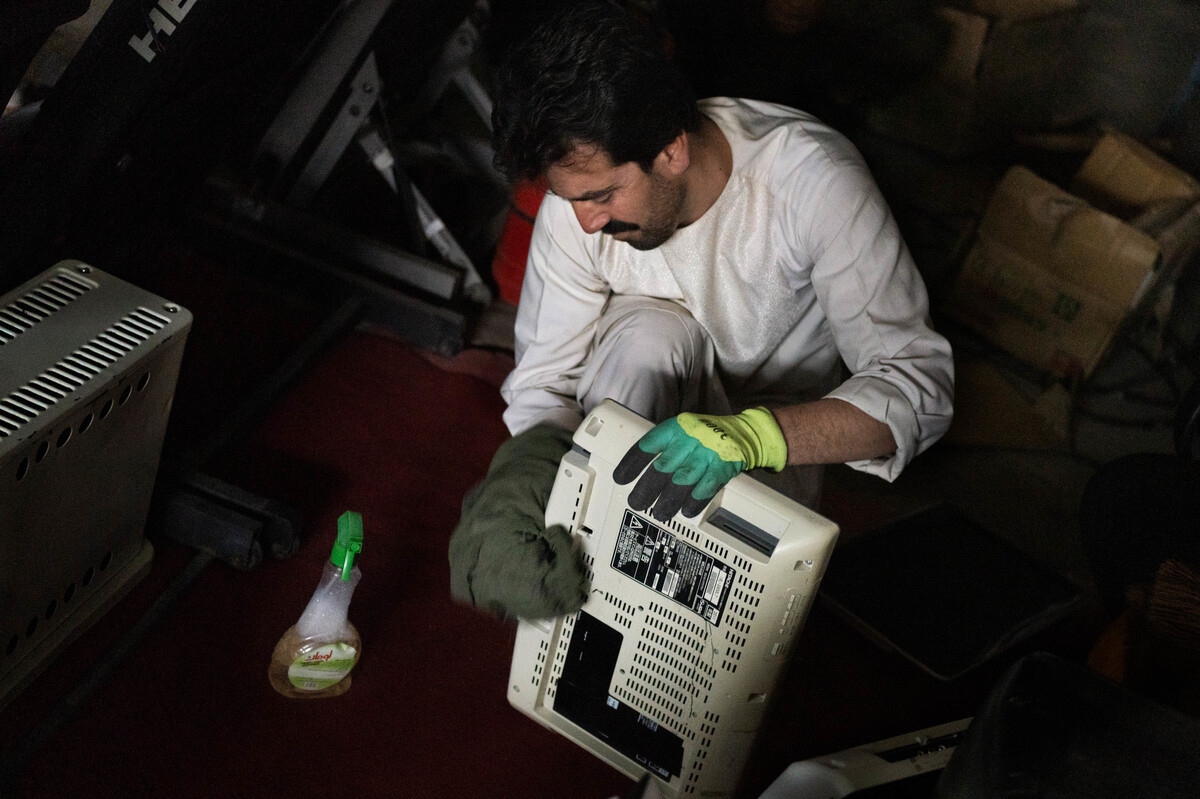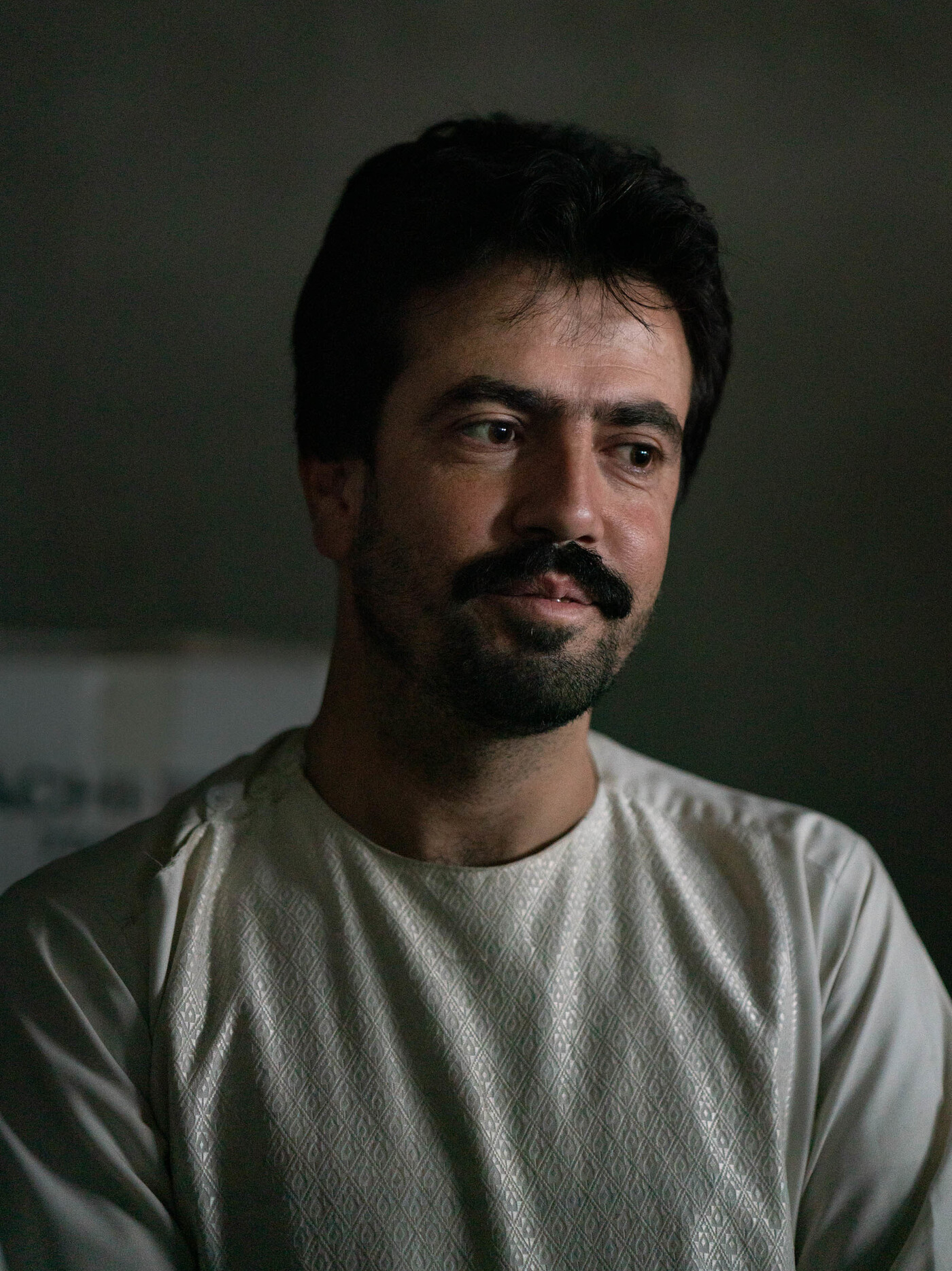
[ad_1]

Mohammad Hashim, a former officer within the Afghan National Army, now picks apples for a residing.
Claire Harbage/NPR
disguise caption
toggle caption
Claire Harbage/NPR

Mohammad Hashim, a former officer within the Afghan National Army, now picks apples for a residing.
Claire Harbage/NPR
MAIDAN SHAHR, Afghanistan — When Mohammad Hashim enlisted within the Afghan National Army, he by no means imagined his profession would land him in an apple orchard.
Just a few years in the past, the previous military officer was accountable for establishing army checkpoints in Helmand Province, the place a number of the fiercest combating between Taliban insurgents and Afghan forces came about. Now, he picks apples for a residing.
“There’s no work for those of us who served in the military,” says Hashim as he rigorously unwraps a black-and-white checkered scarf revealing a pile of army coaching certificates. “As you can see, I’m educated and experienced, but this is the best I can find to support my family.”

When the Afghan republic collapsed final yr, so too did its U.S.-backed army. Mohammad Hashim, like tens of 1000’s of Afghan troopers, misplaced his job.
Claire Harbage/NPR
disguise caption
toggle caption
Claire Harbage/NPR

When the Afghan republic collapsed final yr, so too did its U.S.-backed army. Mohammad Hashim, like tens of 1000’s of Afghan troopers, misplaced his job.
Claire Harbage/NPR
When the Afghan republic collapsed final yr, so too did its U.S.-backed army. Overnight, tens of 1000’s of Afghan troopers misplaced their jobs and all of the sudden discovered themselves residing below the thumb of these they spent twenty years combating.
Ever since, life has radically modified for them. Those who as soon as drove tanks now drive taxis. The troopers who as soon as stood in formation now stand in line for meals help. Some former troopers who served throughout the previous republic inform NPR they reside in concern of being detained and disappeared.

Near the orchard, Mohammad Hashim walks previous buildings that present indicators of injury from the conflict.
Claire Harbage/NPR
disguise caption
toggle caption
Claire Harbage/NPR

Near the orchard, Mohammad Hashim walks previous buildings that present indicators of injury from the conflict.
Claire Harbage/NPR
That concern, and the heckling from Taliban who realized of Hashim’s army service, are what led him to pay smugglers to get his youthful brother — additionally a former army officer — throughout the border to neighboring Iran.
Four days after his brother left in October, Hashim was nonetheless unsure of his whereabouts. “We don’t know if he’s still on his way, if he got there, no idea,” says Hashim, who cannot but afford the identical escape along with his spouse and three younger daughters.
And so he works, from daybreak till nightfall, a prisoner of his previous.
“I don’t have one good memory of the war,” says the 29-year-old. “I want to forget everything.”

Mohammad Hashim stands below a tree on the apple orchard the place he works.
Claire Harbage/NPR
disguise caption
toggle caption
Claire Harbage/NPR

Mohammad Hashim stands below a tree on the apple orchard the place he works.
Claire Harbage/NPR
But the recollections are inconceivable to flee. Just past the apple grove, crooked sticks poke out of the earth carrying tattered white flags, marking the graves of fallen Taliban insurgents. Hashim’s boss’ mud brick residence, lengthy caught within the crossfire, has fallen into disrepair. Massive potholes from roadside bombs dot the principle freeway resulting in this orchard. The conflict nonetheless casts a darkish shadow over Hashim’s life.
An ex-commando goes into hiding
Soon after the Taliban raised their flag over Kabul in August 2021, the motion’s leaders declared a normal amnesty for all residents, together with those that served the earlier authorities. “We are assuring the safety of all those who have worked with the United States and allied forces,” said Taliban spokesman Zabihullah Mujahid two days after the capital fell.

A fallen apple sits within the shadow of a tree on the orchard the place Hashim works, not removed from the graves of Taliban insurgents.
Claire Harbage/NPR
disguise caption
toggle caption
Claire Harbage/NPR

A fallen apple sits within the shadow of a tree on the orchard the place Hashim works, not removed from the graves of Taliban insurgents.
Claire Harbage/NPR
After allegations of revenge killings emerged, the nation’s performing Defense Minister Mullah Mohammad Yaqoob reinforced Mujahid’s message, ordering members of the Taliban to not search revenge on any citizen. Still, the United Nations Mission in Afghanistan has alleged greater than 400 circumstances of extrajudicial killings or detentions of former Afghan National Defense and Security Forces within the first six months of Taliban rule.
Watchdog teams and analysts say the management’s directives are both not reaching Taliban rank and file, notably in additional distant villages — or worse but, are ignored altogether.
“What we’re seeing is that while they’re making these proclamations from the central government, they’re not really enforced at any meaningful level outside the central rings of power,” says Chris Purdy, a director at Human Rights First. “They pretty much leave the actual decision-making up to their local commanders.”
What’s additionally clear is that establishing a system of governance after 20 years of conflict hasn’t come simply for the brand new authorities.
“For the 20 years the Taliban were engaged in war, there was not much difference between top commanders and foot soldiers,” says Nasratullah Haqpal, a Kabul-based political analyst. “They were sitting at the same tables, sleeping in the same rooms, and seen as equals and there wasn’t really a hierarchy. So now, when the top leadership says something, lower rank and file don’t always follow them or care.”
The concern of getting caught up on this discrepancy has despatched many former members of the elite Afghan particular forces into hiding.
One former commando who asks to not be recognized as a result of he nonetheless fears for his personal security, and his household’s, tells NPR he by no means lingers in anyone location for greater than a day, afraid he’ll be tracked down and detained. He suspects that is what has occurred to a number of others with whom he served however can not attain.

One former commando who asks to not be recognized as a result of he nonetheless fears for his personal security, set his uniforms and paperwork on fireplace final yr because the Taliban closed in on Kabul and has been in hiding ever since.
Claire Harbage/NPR
disguise caption
toggle caption
Claire Harbage/NPR

One former commando who asks to not be recognized as a result of he nonetheless fears for his personal security, set his uniforms and paperwork on fireplace final yr because the Taliban closed in on Kabul and has been in hiding ever since.
Claire Harbage/NPR
He says he obtained a cellphone name seven months in the past from a person who recognized himself as a Taliban commander asking him to hitch their ranks. He hung up and instantly modified his quantity.
“I can’t believe them,” says the 27-year-old, skeptical that followers of this new authorities could be keen to “forget the many high-ranking Taliban insurgents Afghan special forces eliminated over the years.”
Few methods out
Like many Afghan veterans of the 20-year conflict, the commando is determined to discover a approach in another country however has few choices.
Despite spending years working shoulder-to-shoulder with U.S. forces, he cannot qualify for a special immigrant visa.
“I was paid by the old Afghan government and I don’t have the HR letter I need to get the special immigrant visa,” he says.
He feels annoyed that the State Department will solely settle for a U.S.-issued human sources letter. “That’s the problem many of my friends and soldiers face,” he says.

A prayer rug sits on a window sill in a location the place the ex-commando generally stays.
Claire Harbage/NPR
disguise caption
toggle caption
Claire Harbage/NPR

A prayer rug sits on a window sill in a location the place the ex-commando generally stays.
Claire Harbage/NPR
They all have advice letters from supervisors and American counterparts, he says, however the salaries they earned from the earlier Afghan authorities are costing them a pathway out.
Refugee and immigrant advocates are urging the State Department to broaden its {qualifications} and expedite its approval course of, arguing that even when the appliance course of works as supposed, it will possibly take years for an approval.
“The requirements of the program are very rigid and Afghans have been killed while waiting for visas to be issued,” says Adam Bates, supervisory coverage counsel on the International Refugee Assistance Project, who notes his group wouldn’t exist “if the SIV program functioned efficiently and if not for just the sheer amount of erroneous denials of people and documents being submitted.”
Getting to a neighboring nation to acquire refugee standing can be fraught with dangers.
“If they did not have passports before the government fell, getting one now is very dangerous and sometimes deadly if you or anyone in your family was ever associated with Americans,” says Kendyl Noah, a former U.S. Army medic who labored with the commando throughout her deployment. “Nearby countries either stopped accepting Afghans or are blatantly hostile to Afghans, arresting them, beating them, throwing them back over the border or sometimes handing them to the Taliban directly.”
The State Department does not dispute the hazards.
“We recognize that it is currently extremely difficult for Afghans to obtain a visa to a third country or find a way to enter a third country and may face significant challenges to fleeing to safety,” a State Department spokesman mentioned in an e mail to NPR, including that the division has elevated sources to course of visas extra expeditiously. “We also particularly urge states to uphold their respective obligations to not return Afghan refugees or asylum seekers to persecution or torture.”

Siraj Zamanzai cleans used electronics at a store. He was unemployed for a yr earlier than discovering this job.
Claire Harbage/NPR
disguise caption
toggle caption
Claire Harbage/NPR

Siraj Zamanzai cleans used electronics at a store. He was unemployed for a yr earlier than discovering this job.
Claire Harbage/NPR
With few methods out, advocates and analysts fear about the place former members of this former combating pressure could flip if they’re indefinitely unemployed and ostracized.
The commando says different Afghan army veterans have contacted him with info on tips on how to be a part of Russia’s army. They escaped to Iran and had been recruited there, however he says it is out of the query for him.
“I will never join a force that’s working against America,” he says, acknowledging that others who’ve households to assist might not be able to show down the proposition.
“That Afghans would find themselves taking salaries to work on the side of a country that invaded them in the ’80s and committed terrible atrocities — the working calculus is going to be ‘How do I feed my family and how do I survive,'” says Douglas London, ex-CIA chief of counter-terrorism for South and Southwest Asia. “It is in the interest of our national security to try to mitigate against the risk of these folks working for adversaries.“
Some in menial jobs think about themselves fortunate
On the outskirts of Kabul, 36-year-old Siraj Zamanzai is attempting to make the most effective of his new life.

Siraj Zamanzai says he considers himself among the many fortunate ones, as his revenue permits him to assist his household.
Claire Harbage/NPR
disguise caption
toggle caption
Claire Harbage/NPR

Siraj Zamanzai says he considers himself among the many fortunate ones, as his revenue permits him to assist his household.
Claire Harbage/NPR
After a yr of unemployment, the previous military captain just lately discovered a job as a shopkeeper’s assistant at a secondhand retailer, the place he earns $3 a day unboxing used home equipment imported from Japan.
Even although Afghan troops had been typically not paid on time and the dimensions and energy of the combating pressure was regularly overstated by U.S. and Afghan officers, it was work that Zamanzai took nice delight in for the 12 years he served.
“We were valuable people who made a lot of sacrifices to serve our country, and now look at us — look at me,” he says.
But that is so far as his criticisms go.
He treads rigorously speaking in regards to the Taliban, specializing in how “both sides lost too many martyrs in the war.” He casts doubt on allegations of Taliban mistreatment that he says he “must see for himself to believe.”
Zamanzai considers himself among the many fortunate ones.
“At least I’m in a position to help my family survive,” he says in the beginning of his 12-hour work day. “So many other families lost their fathers or husbands in the war and are out there begging on the streets.”
[adinserter block=”4″]
[ad_2]
Source link


